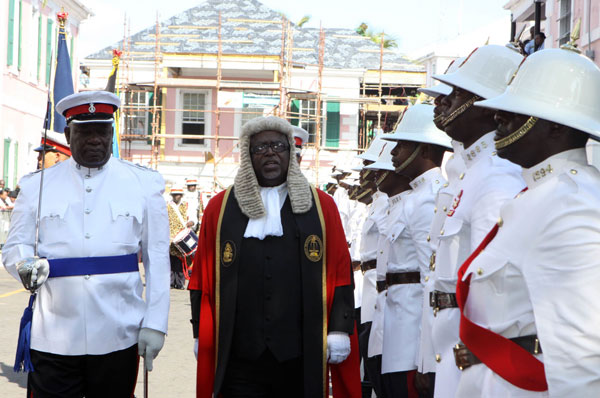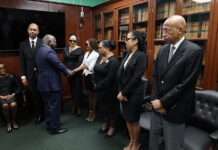Determining property rights of cohabiting gay couples: A lesson from The Bahamas

The Court’s decision shows that, at least in The Bahamas, the law is no longer blind to the familial arrangements of gay couples…
By Prince Neto DCB Waite
The global fight for lesbian, gay, bisexual and transgender (LBGT) rights sits on a continuum from the fight for mere survival to the fight to live with equal dignity to heterosexual couples. In general, the Commonwealth Caribbean rests at the lower end on that continuum where survival—freedom from violence (vigilante killing hate crimes and abuse), freedom from criminal sanction and access to basic amenities (e.g. healthcare and housing)—is the central goal of LGBT rights advocacy. In this region, the Commonwealth of the Bahamas’ position as somewhat of a regional outlier was confirmed by its Court of Appeal in a recent decision.
Two men, BJ and AJ (not their real names) were in an intimate relationship for some fifteen (15) years. After dating for a period of about three (3) months they decided to see each other exclusively. They fell in love and pursued a genuinely committed relationship. Unfortunately, like many couples, BJ’s and AJ’s once loving relationship irretrievably broke down. During the course of their relationship, the couple purchased numerous properties; one was used as their home and the others as investments. Throughout the relationship they also purchased pieces of art work, a boat and a truck. Even though BJ provided all the purchase monies, the investment properties were held in their joint names, either as tenants in common or joint tenants. The couple’s home, however, was held in the sole name of BJ. The boat and truck were held in joint names and the art works, purchased by BJ, were on display in the family home.
Following the dissolution of the relationship, BJ began legal proceedings against AJ in The Bahamian Supreme Court contending that as he was the one that provided all of the purchase monies, he was the sole owner of the legal and beneficial interests of all of the real and personal properties. AJ contended that they shared the properties equally. The Supreme Court agreed with BJ’s assertions. AJ appealed to the Court of Appeal.
Applying the Common Intention
Principle to a Cohabiting Gay Couple
The Court of Appeal separated the properties into two categories: (1) Investment Property and (2) Domestic Property. What is notable about the decision is how the Court dealt with the domestic properties. The Bahamian Court of Appeal shared the view of the UK House of Lords (as expressed in a case concerning a heterosexual cohabiting couple that contributed unequal money towards the purchasing of the family home) that “cohabiting couples are in a different kind of relationship. The place where they live together is their home. Living together is an exercise in give and take, mutual co-operation and compromise. Who pays for what in regard to the home had to be seen in the wider context of their overall relationship. A more practical, down to earth, fact based approach is called for.” It follows then that monetary contribution towards purchasing domestic properties is not the sole deciding factor as to where the beneficial interests lay. The Court of Appeal disagreed with the Supreme Court Judge that the sentiments expressed by the Law Lords did not apply to the case between BJ and AJ. The Court stated that “[t]his aspect of the case is clearly about the rights of a cohabiting couple in a house which they occupied together.” As such, the determining factor in the present context is whether there was a “common intention between the parties [that] they were to share the beneficial interest in [the home].”
The two most remarkable things about the Court of Appeal’s decision are: (1) the recognition that a cohabiting gay couple is a domestic context, and (2) cohabiting gay couples are on the same legal footing as cohabiting heterosexual couples. In recognizing the couple, the Court said: “The evidence before the court below [the Supreme Court], although the parties shied away from making any reference to it in this Court, was clearly that [BJ] and [AJ] had an intimate relationship for the nearly 15 years they lived together.” Even in the men’s shyness, the Court of Appeal recognized that as they were a former couple it was only fitting to characterize their relationship as a domestic context. The Court could have treated the men as cohabiting friends, but it did not. In a matter-of-fact way, the Court of Appeal Judges had before it two men and treated them with human dignity by recognizing their intimate relationship and cohabitation as a proper domestic context for the purpose of deciding where the beneficial interests in the property lay.
Having treated the former couple’s home as a domestic context, the Court went on to apply the common intention principle to determine who held the beneficial interest. The Court’s apparent thought process was this: Is this a domestic context? Yes, because they were a cohabiting couple. What legal rules are we to apply? We apply the rules that are relevant to cohabiting couples. The sexual orientation of the men was irrelevant. Having identified them as a couple, the principles of non-discrimination and equality before the law were embedded in the Court’s decision—For the purpose of disposition of property in relation to a former cohabiting couple, heterosexual couples and gay couples are on equal footing before law.
The Court’s decision shows that, at least in The Bahamas, the law is no longer blind to the familial arrangements of gay couples. So, as gay couples embark on life together and entangle their affairs as ordinary couples do they should know that there are rules of family law and property law that apply to them. Where a court is asked to determine the shared interests (if any) of the domestic property of a former cohabiting couple (gay or straight) it is well to be aware that the court will look at the wider context of your overall relationship. Some things that the court may consider include: (1) advice given at the time of purchase of the property, (2) reasons for registration in joint names or sole name, (3) purpose for purchasing the property, (4) how the purchase of the property was financed, initially and subsequently, (5) whether couple is jointly liable for the mortgage, (6) how the couple arrange their finances, separately or together, (7) nature of couple’s relationship, and (8) whether there are children for which both are responsible to provide a home.
Regional Applicability
It is wise to note that even though the decision is situated in a context specific to The Bahamas, that is, Parliament’s failure to account for common law or long-term relationships in the property law regime and the decriminalization of same sex sexual relations, it is not unreasonable to suggest that these facts do not prevent the application or adoption of The Bahamian approach in other countries in the region.
Absence of Property Law Rule for Cohabiting Gay Couples
The common intention principle effectively empowers a court to determine the property rights of couples or cohabitees. The principle arose in the UK where the House of Lords felt that the British Parliament failed to devise a scheme for the disposition of domestic property that was in-keeping with the ‘changing social and economic circumstances’. These circumstances were the diversity of domestic circumstances or contexts other than marriage. Consequently, the court had to step in. The relevant question in the Commonwealth Caribbean is whether there is a diversity of domestic circumstances, which the parliaments have failed to take into account when shaping the relevant rules on property rights. In The Bahamas the answer is yes; The Bahamian Parliament enacted rules only for married couples, not heterosexual common law unions, or any other type of long-term relationship or cohabitation. It follows to reason that the basis on which the UK House of Lords acted also exists in The Bahamas. Similar failings of the legislature exist across the Caribbean but in a different form. While jurisdictions like Jamaica, Guyana, Trinidad and Tobago, Barbados and Belize devised a scheme that takes account of long-term heterosexual relationships they fail to apply them to cohabiting gay couples. This failure was long recognized by a judge of the Jamaican Supreme Court. This legislative failure creates the basis on which other courts in the region can find persuasive the approach taken by the Bahamian Court of Appeal.
Irrelevance of the Criminalization of Same-Sex Sexual Relations
As early as 1991 in the Sexual Offences and Domestic Violence Act, The Bahamas decriminalized same-sex sexual relations between consenting adults (males and females) in private (see now, Section 5B, Sexual Offences Act). As such, there was no basis, in the case of BJ and AJ, for questioning the legality of the domestic affairs of the parties before the Court of Appeal. This is not the same reality in the wider Commonwealth Caribbean, where same-sex sexual relations remain criminalized in both public and private.
In any event, for the purposes of disposition of domestic property of former cohabiting gay couples the legality of their sexual relations is hardly decisive. Firstly, what the law criminalizes is sexual relations, not cohabitation or the formation of a relationship. As such, a court’s legal characterization of a gay couple’s cohabitation as a domestic context for the purpose of property rights does not turn on the sexual relations of the couple. For that reason, criminalization of same-sex sexual relations should be an irrelevant consideration. Secondly, the constitutional guarantee of the right to privacy fortifies a dispensation that excludes concern with adults’ sexual relations in a domestic context.
To conclude, The Bahamian Court of Appeal’s decision may be seen as less than innovative or groundbreaking because it’s just the application of existing rules to a first-in-time set of facts. However, when viewed in the broader social context of rampant anti-LGBT sentiments in the Commonwealth Caribbean the progressive hue of the decision shines bright.
EDITORIAL NOTE: Prince Neto DCB Waite is a Doctoral Candidate at the New York University School of Law. He is a graduate of the University of the West Indies (Mona Campus and Cave Hill Campus) and Harvard Law School.







